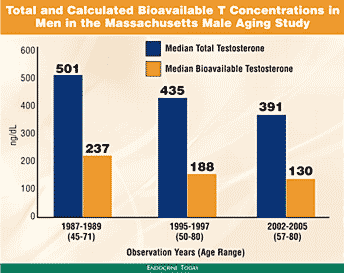
Introduction
Ongoing research has shown for decades that testosterone levels have been on a downward trajectory, sparking concerns about the implications for men's health and well-being. From generation to generation, the average testosterone levels among men have exhibited a steady decline, raising questions about the underlying causes of this phenomenon. In this article, we delve into the complexities of declining testosterone levels and explore the factors contributing to this trend.
What is Testosterone?
Testosterone is a sex hormone, a vital messenger in the body's chemical communication system. These messengers, known as hormones, traverse the body via the bloodstream, influencing various bodily functions.
In males, testosterone takes the spotlight as the primary sex hormone. It holds pivotal importance in fostering male growth and defining masculine characteristics.
The production of testosterone in men is governed by signals dispatched from the brain to the pituitary gland situated at the brain's base. Subsequently, the pituitary gland relays instructions to the testes, prompting them to produce testosterone. This process operates within a "feedback loop" that meticulously regulates hormone levels in the bloodstream. When testosterone levels surge excessively, the brain signals the pituitary gland to dial down production.
What's the Role of Testosterone In Men?
Testosterone serves a multitude of crucial functions in the body, including:
Development of the penis and testes
Deepening of the voice during puberty
Onset of facial and pubic hair growth at puberty; later in life, it may contribute to male pattern baldness
Maintenance of muscle size and strength
Promotion of bone growth and fortitude
Regulation of sex drive (libido)
Stimulation of sperm production.
How Important is Testosterone for Men?
Testosterone plays a crucial role in developing and maintaining typical male characteristics, including muscle mass, body and facial hair growth, and sperm production. A deficiency in testosterone can lead to a range of symptoms, from fatigue to reduced sex drive.
The Generational Decline in Testosterone
A longitudinal analysis of testosterone levels among men reveals a concerning pattern: age-independent declines that transcend generational boundaries. Studies comparing age-matched cohorts over time have uncovered a consistent decrease in testosterone levels, suggesting that factors beyond ageing play a significant role in this decline

What is Causing the Decline in Testosterone in Men?
The decline in testosterone levels among men is a multifaceted phenomenon influenced by various factors, which include the following:
Lifestyle Choices: Sedentary behaviours, poor dietary habits, and excessive alcohol consumption have been implicated in lowering testosterone levels. Research suggests that rising obesity rates and the associated health conditions may exacerbate the decline
Environmental Factors: Exposure to endocrine-disrupting chemicals (EDCs) found in everyday products, such as plastics, has raised concerns about their impact on hormonal balance and testosterone levels. Studies have linked EDC exposure to adverse effects on reproductive health and hormone regulation
Psychological Stress: Chronic stress, coupled with modern-day pressures and digital distractions, may disrupt hormonal balance and contribute to declining testosterone levels. The prevalence of mental health issues, including anxiety and depression, adds another layer of complexity to the issue
Age-Independent Declines: Longitudinal studies have revealed age-independent declines in testosterone levels among men, suggesting that factors beyond ageing play a significant role. While lifestyle changes, such as increased obesity rates and medication use, have been observed, they do not fully account for the generational decline
Endocrine Disruptors: The pervasive presence of endocrine-disrupting chemicals (EDCs) in the environment, including plastics and household products, raises concerns about their impact on hormone regulation and testosterone levels. Research indicates a potential link between EDC exposure and adverse effects on reproductive health.
Should Men Be Worried About Declining Testosterone?
While the decline in testosterone levels is a cause for concern, current averages have not yet reached critically low levels for the overall population. However, the gradual decline raises questions about the future of men's health and reproductive viability. Testosterone replacement therapy (TRT) prescriptions have surged in response to the growing awareness of testosterone deficiency - this isn’t just due to more mainstream acceptance, it’s also because of the overall trend of decreased testosterone in younger generations.
the gradual decline raises questions about the future of men's health and reproductive viability.
How To Measure Testosterone Levels
Routine measurement of testosterone levels is unnecessary unless symptoms of low testosterone are present. When testing for low testosterone the most accurate option is usually to complete a blood test . These tests measure:
Total testosterone: This includes testosterone that is bound to proteins as well as free-floating testosterone.
Free testosterone: This specifically measures the amount of testosterone that is not bound to proteins, which can be helpful in diagnosing certain medical conditions.
You can undergo these blood tests either at a medical facility, where a healthcare professional will administer the test and send the sample to a lab for analysis, or you can opt for an at-home testosterone test kit. With the at-home kit, you collect the sample yourself and send it to a lab for processing. Results are typically available within a few days.
For males under the age of 45, it's usually recommended to have the testosterone test performed in the morning when testosterone levels tend to be at their highest. In some cases, the test may need to be repeated to confirm the results.
Conclusion
In conclusion, the decline in testosterone levels among men is a multifaceted issue influenced by lifestyle, environmental, and biological factors. Understanding the complexities of this trend is essential for developing targeted interventions to promote men's health and well-being in the face of evolving challenges.
As leaders in Telehealth and offering 100% private telehealth services, The Functional Doctors offers specialised TRT care nationwide in Australia. Wherever you are, we're here for you - book your free consultation with our patient-care team to get started!
While we've ensured that everything you read on our blogs is medically reviewed and approved, the information is not intended as a substitute for professional medical advice, diagnosis, or treatment. You should never rely on this blog for specific medical advice, and if you have any questions or concerns specific to your personal case, you should speak to your doctor or reach out to our team directly.
